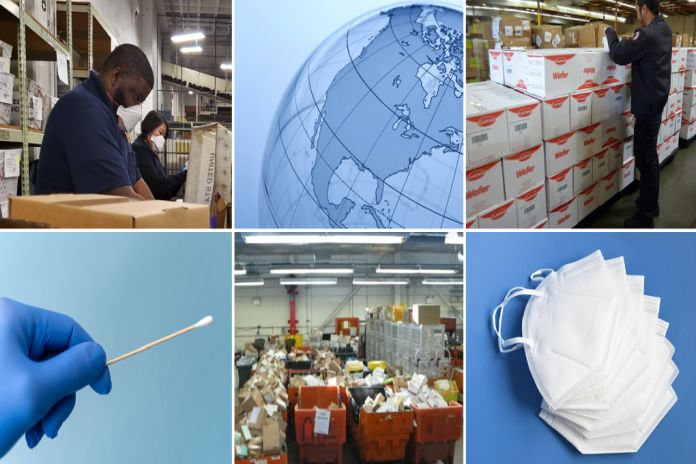By Judy McMeekin
The US Food and Drug Administration (FDA) continues to use all tools and flexibilities available to us as we partner with federal, state, and local agencies and public health officials across the country, to combat COVID-19. A critical part of the FDA’s work is ensuring the safety and security of the US supply of food and medical products.
Many of the medical products our health care workers and hospitals need to battle COVID-19 come from overseas, which makes the FDA’s Office of Regulatory Affairs (ORA) work imperative to ensure products are moving as quickly as possible through the ports of entry.
The FDA is facilitating the entry of imported personal protective equipment (PPE) and COVID-19 test kits as well as drugs and medical devices, that are needed to provide supportive care for sick and hospitalized patients. Many of these products are also critical for essential workers, such as grocery store employees, food manufacturers and caregivers, who also need PPE to safely perform their essential duties. We are making sure that products move quickly to their destinations so frontline health care workers and essential workers have the tools they need to protect themselves and so that patients receive necessary care.
ORA protects the supply chain in two equally critical ways: first, we help ensure safe products are coming in and second, that illegal, dangerous and fraudulent products do not get into the country. As ORA staff screen medical products entering our country, we also find and block the entry of fraudulent products that falsely claim to prevent, diagnose, treat, or cure COVID-19. For example, we found fraudulent COVID-19 test kits at the international mail facilities that were declared as “water treatment,” which may lead users to incorrectly think they are protected from the virus when in fact they can unknowingly contract and spread it to others.
Importing products for the US market can be a complex process involving multiple federal agencies. The FDA works closely with US Customs and Border Protection (CBP) to clear FDA-regulated products for entry into the United States. ORA staff are responsible for ensuring that imported PPE, and medical products needed to care for and treat COVID-19 patients are reviewed and verified as quickly as possible. Risk-ranking technology tools and systems expeditiously clear shipments that comply with import regulations and have proper documentation – in many cases, within minutes.
The FDA is using the risk-ranking technology tool PREDICT on commercial shipments, numbering in the thousands, to release packages with accurate documentation and shipping contents in minutes rather than days. Overall, the FDA reviews more than 45 million of these shipments each year. Smaller, non-commercial shipments often enter through the US international mail facilities and undergo their own screening process.
FDA entry reviewers prioritize, and screen items offered for import to verify that the shipment can be released into domestic commerce. In instances where the shipper does not provide the appropriate documentation, the FDA must contact the shipper, the importer, the broker, or other parties involved to ensure that we have complete documentation. This process can cause delays, at times creating frustration for the recipient. However, the FDA wants to ensure that we have complete information to determine whether the product is in compliance with US laws and regulations before it enters domestic commerce.
We also want to make sure that delays for legitimate shipments are avoided. To facilitate this, we urge importers to familiarize themselves with the FDA’s instructions and to accurately and completely document shipment contents. To minimize disruptions during the importing process, we provide guidance to importers. Industry is encouraged to use our special email inbox, COVID19FDAIMPORTINQUIRIES@fda.hhs.gov, to quickly communicate with us to answer questions and resolve concerns.
Currently, there is no evidence of food or food packaging being associated with the transmission of COVID-19. We have temporarily postponed physical inspections of foreign-produced FDA-regulated products, but we employ other tools, such as portable screening devices, risk ranking tools, database trend analysis applications and others, to help ensure the safety of products imported to the US – tools that have proved effective in the past.
Our import operations team conducts certain inspections remotely rather than at an importer’s place of business. This applies to Foreign Supplier Verification Program (FSVP) inspections for human and animal foods. The FDA’s rule for FSVP requires importers to perform certain risk-based activities to verify that their foreign supplier is producing the food in accordance with US food safety standards. Prior to the COVID-19 outbreak, FSVP inspections were conducted onsite. As of early April, we shifted to temporarily conducting these inspections remotely.
Our investigators are contacting importers subject to remote inspections to explain the remote inspection process and request electronic records; see the April 3 constituent update and the March 2020 guidance for details. This adaptation helps us ensure the safety of imported FDA-regulated products during the COVID-19 public health emergency.
Facilitating access to safe food, medical products and PPE is and will continue to be crucial for the foreseeable future. I am proud of the FDA as we are rising to the challenge and quickly adapting our processes to address the pandemic. We are determined to emerge even better and stronger and will pursue all avenues available to protect public health during, and beyond, the COVID-19 pandemic.
By Judy McMeekin, Pharm. D., Associate Commissioner for Regulatory Affairs






